Death and Rebirth, Mountain Pine Beetle, Pesticides, Carcinogens, Cancer
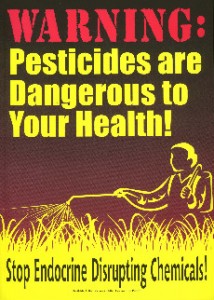 I had the pleasure of spending part of the Memorial Day holiday in Grand Lake, Colorado. In fact, I have been going there for over a decade with my family, enjoying the serenity and beauty of the summers with boating on grand lake, miniature golf, hiking, and the winters with snowmobiling and cross country skiing. It is fair to say that for us, Rocky Mountain National Park (http://www.nps.gov/romo/index.htm) and Grand Lake are some of the most magnificent places on earth…at least they were. Recently nature has run its course, doing for the forest what used to be handled only by forest fires – cleansing.
I had the pleasure of spending part of the Memorial Day holiday in Grand Lake, Colorado. In fact, I have been going there for over a decade with my family, enjoying the serenity and beauty of the summers with boating on grand lake, miniature golf, hiking, and the winters with snowmobiling and cross country skiing. It is fair to say that for us, Rocky Mountain National Park (http://www.nps.gov/romo/index.htm) and Grand Lake are some of the most magnificent places on earth…at least they were. Recently nature has run its course, doing for the forest what used to be handled only by forest fires – cleansing.
In case you haven’t heard of it, Mountain Pine Beetle (MBP as it is affectionately called) is ravishing much of our pine forests in North America. They have destroyed millions of pine trees, over 250 square miles, leaving once forested areas barren. MPB is expected to wipe out 80% of the forests in British Columbia by 2013 (http://www.mpb.alberta.ca/).
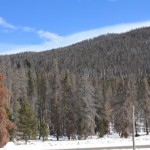
MPB in RMNP
In centuries past, forest fires would cleanse the forest, making space for new growth and rebirth. The cause of the beetle spread reportedly is related in many ways to our efforts to limit forest fires, which has inadvertently increased the food supply for beetles. Yes, forest fires are natures’ colon cleanse – cleaning out the old to make way for the new. Trees do have a natural propensity to protect themselves, attempting to cleanse the beetle by pushing them out with their own sap. However, this only works in healthy trees…less healthy trees are more susceptible to beetles.
The real travesty is that lodgepole pines release pinecones, but the pinecones don’t actually release their seeds until they are heated by fire. Yes, the forest naturally rebirths itself through fire. Our intent to “manage” fire only impedes the natural cycle of life within the forest, in many ways giving our forests the opportunity to overgrow themselves. This is not to say that we should allow forest fires; only that we need to understand the problem if we are going to solve it.
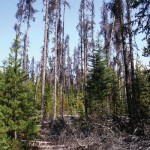
Mountain Pine Beetle Dead Trees
We cannot actually win the fight against MPB, but we don’t want to give up. The most effective way to manage pine beetles is to use the integrated pest management (IPM) strategy. This includes removing and cutting dead trees as well as thinning trees to maintain a healthy forest. Insects go to weak trees; the ecosystem is always trying to get into balance. Unfortunately, the solutions we find often do more harm than good, much like the 785,000 gallons of toxic dispersants BP has released into the ocean to attack the estimated 20 million gallons of oil they released (as of this posting). In the end, they both will destroy our oceans, marine life, food supply, jobs, beaches, and much more.
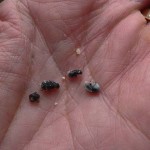
Actual Pine Beetles
MPB isn’t limited to just the national forest, it has spread to communities like ours. But in the same manner, instead of managing our trees by thinning and helping them become healthy so that they can protect themselves, some foolishly believe that they can “save” their pine trees by soaking them in hundreds of gallons of pesticides, known carcinogens (U.S. Environmental Protection Agency) like permethrin and carabaryl. Will they kill the pine beetle? Sure…andsince they have to continue spraying every year, they will eventually kill the tree, hundreds of species of wildlife, while poisoning the earth and our well-water.
Is it worth putting your family at risk to save a tree?
What is wrong with us? Are we so short sided that we can’t see the forest through the trees (pardon the intentional pun). In the end, nature will always win, but by attempting to control nature, in essence we create much larger problems for ourselves. The true irony is that I (we) went to Grand Lake to escape from the stupidity of some of our neighbors who had chosen to use pesticides in an attempt to save a few pine trees at the expense of their own health, that of their neighbors, their well water, and our environment. Perhaps this is a charged issue for me…I am a two-time cancer survivor after-all.
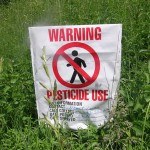
Warning Pesticides
The number of cancers caused by growing exposure to environmental toxins has been “grossly underestimated”, according a report from the US President’s Cancer Panel published on May 6th, 2010. “[The report] warns of ‘grievous harm’ from chemicals and other hazards, and cites ‘a growing body of evidence linking environmental exposures to cancer’, according to The New York Times (http://www.nytimes.com/2010/05/07/health/research/07cancer.html). Children are especially vulnerable, the panel says. It urges the government to strengthen research and regulation, and advises individuals on ways to limit exposure to potential threats like pesticides… Here is a short blurb from the 240-page report from the United States President’s Cancer Panel:
In the aggregate, registered pesticides contain nearly 900 active ingredients, many of which are toxic. Many of the inert ingredients in pesticides also are toxic, but are not required to be tested for causing chronic diseases such as cancer. For example, xylene is used as the inert ingredient in almost 900 pesticides and has been associated with increased risk of brain tumors, rectal cancer, and leukemia.
I truly hope that future generations are smarter than we are. Maybe we can stop spraying toxic chemicals on the soccer fields where our children play. Perhaps we can stop eating foods saturated in chemicals (especially when even the farm workers themselves get sick http://www.panna.org/resources/panups/panup_20100604). Maybe we can stop drinking milk full of hormones, or eating meat from animals who have been given dangerously high doses of antibiotics. Behind every greedy corporation are human beings, each with a conscience. It may take time, but hopefully we can make a difference before its too late.

Your Friendly Goat
There is no quick fix to the problems in our life. We cannot simply spray a chemical on a symptom and hope that it fixes the problem – that would be like taking pain medicine for a brain hemorrhage. In the context of our lives, we are given many opportunities for growth and rebirth. In any moment, we are given the opportunity to grow, to learn, and to evolve. If we disregard the truth and the opportunities before us, many times the challenges and the associated risks only become greater.
In the end, everything will work out, it always does – but there is a very real cost to our actions. Let’s decide to make better decisions, to put our families first, our health first, and our environment first.
Leave a Website Comment










